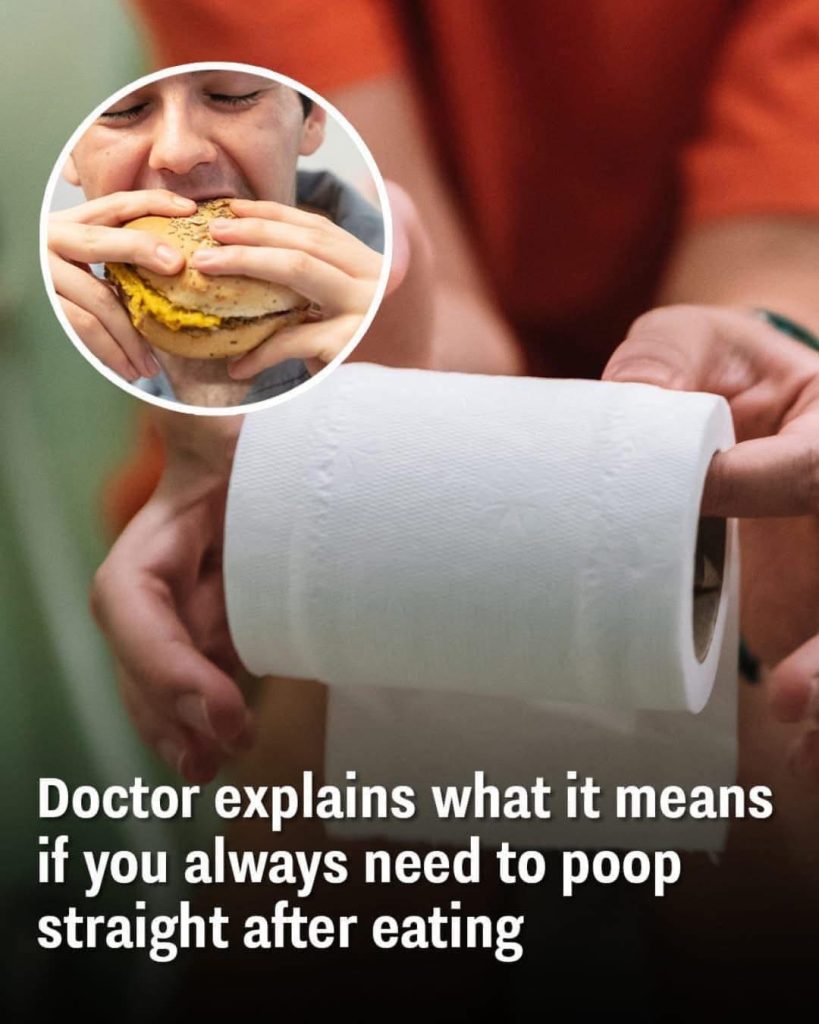A doctor has shared insights about what it might mean if you find yourself needing to use the restroom shortly after eating. As highlighted by a TikTok physician, if you often feel the need to rush to the bathroom right after a meal, rest assured you are far from alone. This phenomenon is surprisingly common, and while it may seem unusual, there is a clear explanation for it.

Contrary to popular belief, this doesn’t mean that the food you just ate is moving quickly through your digestive system. Instead, the cause is a natural bodily response known as the “gastrocolic reflex.” This reflex is a fascinating physiological process that activates your lower gastrointestinal (GI) tract whenever you eat, prompting the urge to have a bowel movement.
The Gastrocolic Reflex: What It Is and How It Works
The gastrocolic reflex is a perfectly normal function of the human body. According to health experts at VeryWell Health, this reflex is a response designed to make room in your digestive system after a meal. It ensures that your GI tract can handle additional food and nutrients efficiently.
Dr. Salhab, a medical expert, explains that this reflex begins when your stomach stretches to accommodate food. This stretching sends signals to your brain, which then communicates with your colon. The colon responds by contracting, which helps move its contents along. These contractions often trigger the urge to use the restroom.
Interestingly, the stool your body expels shortly after eating isn’t from the meal you just consumed. Instead, it is older waste material and water that your colon has been storing. Dr. Salhab emphasizes that this is a routine process, not a sign of a medical problem, and plays an essential role in maintaining a healthy digestive system.
Sensitivity of the Gastrocolic Reflex in Certain Individuals
For some people, the gastrocolic reflex can be more intense. Those with irritable bowel syndrome (IBS), for instance, may experience an unusually sensitive gastrocolic reflex. IBS is a chronic condition that affects the digestive system and often causes discomfort. According to the Cleveland Clinic, common IBS symptoms include abdominal pain, constipation, diarrhea, bloating, and gas.
Dr. Salhab notes that individuals with IBS may feel significant cramping, sharp abdominal pain, or even diarrhea after eating. This heightened sensitivity occurs because the colon’s contractions are much stronger and more frequent in these cases. While this can be distressing, there are effective strategies to manage the symptoms.
Strategies to Ease Symptoms
If you frequently experience discomfort after eating, there are several ways to mitigate the symptoms associated with an overactive gastrocolic reflex. Diet plays a crucial role in managing this condition. Making intentional changes to what you eat can significantly reduce episodes of discomfort or urgency.
Dr. Salhab recommends keeping a food diary to identify specific triggers. Foods and beverages such as carbonated drinks, alcohol, citrus fruits, fried or fatty foods, and sometimes dairy products are common culprits. By identifying and avoiding these triggers, you can reduce the frequency and intensity of symptoms. While this may mean cutting back on some of your favorite indulgences, the long-term benefits for your digestive health are well worth the effort.
Another helpful strategy is eating smaller meals throughout the day instead of consuming large portions at once. This approach reduces the likelihood of overwhelming your digestive system and triggering a strong gastrocolic response. Additionally, incorporating fiber-rich foods into your diet can help regulate bowel movements and improve overall gut health.
Additional Tips for Digestive Wellness
Beyond dietary changes, there are other steps you can take to support a healthy digestive system. Regular physical activity, for example, is beneficial for maintaining optimal gut function. Exercise helps stimulate digestion and can alleviate symptoms like bloating or sluggishness.
Stress management is another important factor. High stress levels can exacerbate digestive issues, including IBS. Practices such as mindfulness, meditation, or yoga can be valuable tools for reducing stress and promoting a calmer, healthier gut.
If your symptoms persist or significantly interfere with your quality of life, it may be time to seek medical advice. A healthcare professional can perform tests to rule out other conditions and provide personalized recommendations tailored to your needs.
Understanding Your Body
It’s essential to recognize that the gastrocolic reflex is a normal and necessary function of your body. While it might be inconvenient at times, it plays a critical role in maintaining digestive health. For those with more pronounced symptoms, understanding the underlying mechanisms of this reflex can help you take proactive steps to improve your well-being.
Dr. Salhab’s insights shed light on an everyday phenomenon that many people experience but might not fully understand. By educating yourself about the gastrocolic reflex and its potential sensitivities, you can make informed choices to enhance your digestive health and overall quality of life. Whether through dietary adjustments, lifestyle changes, or medical support, there are effective ways to manage symptoms and keep your digestive system functioning at its best.





